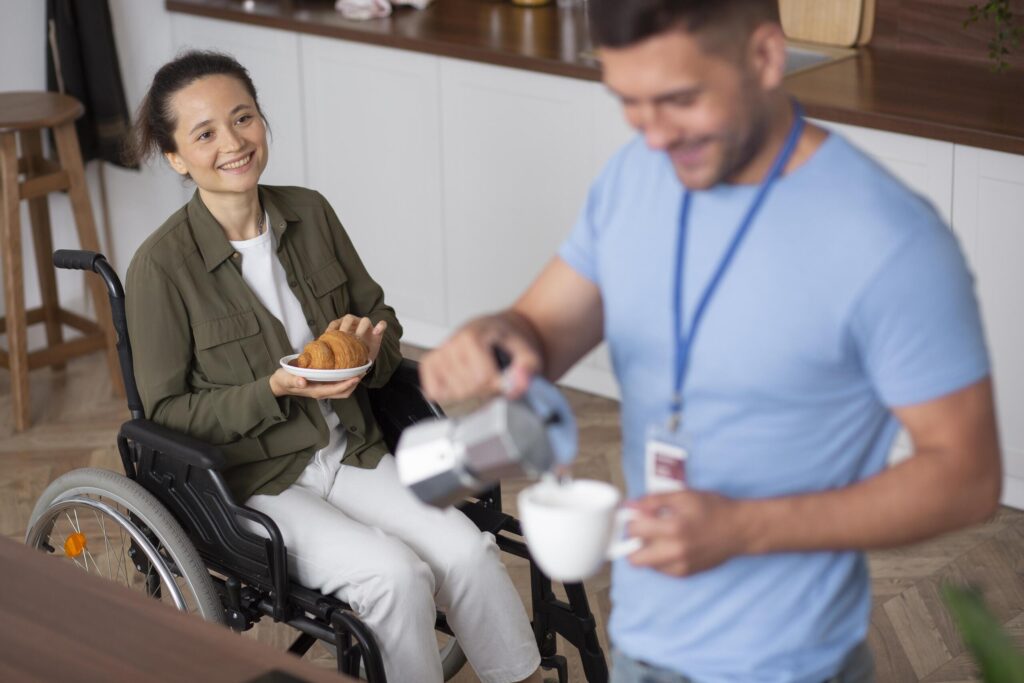The National Disability Insurance Scheme (NDIS) in Australia has transformed the landscape of disability support, offering individuals with disabilities greater control and choice over their accommodation options. Two key aspects of NDIS accommodation that participants often encounter are Specialist Disability Accommodation (SDA) and NDIS Short Term Accommodation (STA). In this comprehensive guide, we will explore the basics of these two types of NDIS accommodations, providing insights to help participants and their families make informed decisions regarding their living arrangements.
Specialist Disability Accommodation (SDA)
Specialist Disability Accommodation (SDA) is a specialised form of housing designed to cater to individuals with extreme functional impairment or very high support needs. This type of accommodation is intended for those participants whose disability significantly impacts their ability to live independently and requires unique housing solutions. Key features of SDA include:
High-Level Accessibility
SDA properties are constructed or modified to provide high levels of accessibility, ensuring that residents can navigate their living spaces with ease, regardless of their mobility challenges.
Specialised Design
SDA properties incorporate design features that address the specific needs of residents, such as assistive technology integration, wide doorways, and accessible bathroom facilities.
Location Considerations
SDA properties are strategically located to offer proximity to essential services, medical facilities, and community support networks.
Eligibility Criteria for Specialist Disability Accommodation (SDA)
To access SDA funding through the NDIS, participants must meet certain eligibility criteria, including

Extreme Functional Impairment or High Support Needs
Participants must have a significant functional impairment or high support needs that necessitate the provision of specialist accommodation.
SDA Design Category
SDA properties are categorised based on design features, ranging from improved livability to fully accessible. The level of funding is determined by the designated category.
NDIS Short Term Accommodation (STA)
NDIS Short Term Accommodation (STA) provides participants with temporary accommodation options, offering flexibility and support during specific situations. STA is not intended for long-term residence but serves as a transitional arrangement for various purposes, such as
Crisis Situations
NDIS Short Term Accommodation can be utilised in emergency or crisis situations when a participant’s usual support arrangements are temporarily unavailable.
Planned Respite
Participants and their families may opt for STA to facilitate planned respite, providing a break for both the participant and their primary carers.
Skill Development
NDIS Short Term Accommodation can be utilised for participants to build and enhance their daily living skills in a supported environment.
Key Features of NDIS Short Term Accommodation (STA)
Support Staff: NDIS Short Term Accommodation are staffed with support personnel who can assist participants with their specific needs and requirements during the temporary stay.
Tailored Support Plans: Each participant’s short-term stay is accompanied by a tailored support plan that addresses their unique goals and objectives for the duration of their accommodation.
Community Integration: STA aims to provide participants with opportunities to engage with the local community, fostering social connections and enhancing their overall well-being.
Choosing Between SDA and STA: Factors to Consider
When navigating NDIS accommodation options, participants and their families should consider several factors to make informed decisions:
Long-Term Needs: If a participant requires ongoing, specialised support due to extreme functional impairment, SDA may be the appropriate choice. However, for temporary needs or transitional support, STA may be more suitable.
Independence Goals: Participants with long-term independence goals may find that SDA, with its tailored design features, better aligns with their vision for a permanent living arrangement.
Flexibility Requirements: STA offers flexibility for short-term stays in different locations, making it a viable option for those seeking varied experiences or facing temporary disruptions in their regular support arrangements.
The Role of NDIS Providers in Accommodation Solutions
Navigating the complexities of NDIS accommodation can be simplified with the support of experienced NDIS providers. These providers play a crucial role in helping participants understand their options, assess their needs, and access suitable accommodation solutions that align with their goals and preferences

Key differences between Specialist Disability Accommodation (SDA) and NDIS Short Term Accommodation (STA)
| Feature | Specialist Disability Accommodation (SDA) | NDIS Short Term Accommodation (STA) |
| Purpose | Long-term housing solution for individuals with extreme functional impairment or very high support needs. | Temporary accommodation for specific situations, such as emergencies, respite, or skill development. |
| Duration of Stay | Intended for long-term residence. | Temporary stays typically ranging from a few days to a few weeks. |
| Eligibility Criteria | Participants must meet criteria for extreme functional impairment or high support needs. | Available for various purposes, including crisis situations, planned respite, or skill development. |
| Design Features | Specially designed or modified properties to meet the unique needs of residents. | May not have specific design features but is equipped to provide temporary support. |
| Location Considerations | Strategically located for proximity to essential services and community support networks. | Location may vary, providing flexibility for participants in different regions. |
| Funding Mechanism | Funding for SDA is part of the NDIS, allocated based on the participant’s specific needs and the designated SDA category. | STA is funded by the NDIS for short-term stays, with funding based on the participant’s support requirements during that period. |
| Support Staff | May have support staff, but the emphasis is on providing a permanent, supportive living environment. | Staffed with support personnel to assist participants during their temporary stay. |
| Tailored Support Plan | Supports participants with a tailored plan for their unique goals and objectives in a long-term living scenario. | Provides a short-term support plan to address specific needs and objectives during the temporary stay. |
| Community Integration | Encourages integration within the local community for long-term residents. | Emphasises community engagement during the short-term stay, promoting social connections. |
| Flexibility | Limited flexibility for relocation, as SDA is designed for the specific needs of the participant. | Offers flexibility for short-term stays in various locations, catering to different experiences or situations. |
| Provider Involvement | Collaboration with NDIS providers for access to suitable SDA properties based on participant needs. | NDIS providers assist in coordinating and arranging short-term accommodation options according to the participant’s requirements. |
| Goal Alignment | Aligned with long-term independence goals and permanent housing solutions. | Meets short-term goals and addresses immediate needs, with a focus on temporary support and transitions. |
Conclusion: Making Informed Choices for NDIS Accommodation Support
In conclusion, possessing a solid understanding of the fundamentals associated with Specialist Disability Accommodation (SDA) and NDIS Short Term Accommodation (STA) is crucial for individuals and families navigating the dynamic landscape of the National Disability Insurance Scheme (NDIS). Whether one is in search of a permanent residence with specialised features or a temporary solution designed for respite or skill development, participants stand to gain significantly by exploring the diverse options available to them.
By taking the time to carefully evaluate their long-term needs, independence goals, and flexibility requirements, individuals can make well-informed choices that pave the way for a gratifying and well-supported living experience within the framework of the NDIS. For additional details or assistance with NDIS accommodation support, consider reaching out to TK Community Care for comprehensive support and guidance tailored to individual needs within the NDIS accommodation domain.



